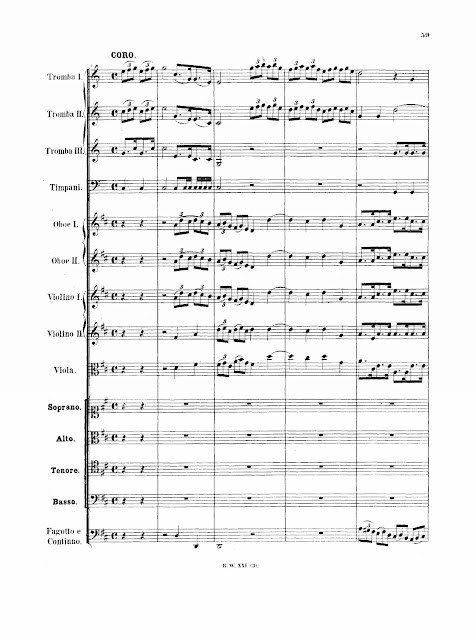DCCLXXIII. BACH, J.S. (1685--1750)
Easter Oratorio, BWV 249 (1725)
1. Sinfonia
2. Adagio
3. Chorus: Kommt eilet und laufet
4. Recitative (Soprano, Alto, Tenor, Bass): O kalter Männer Sinn
5. Aria (Soprano): Seele, deine Sperzereien
6. Recitative (Alto, Tenor, Bass): Hier ist die Gruft
7. Aria (Tenor): Sanfte soll mein Todeskummer
8. Recitative (Soprano, Alto): Indessen seufzen wir
9. Aria (Alto): Saget, saget mir geschwinde
10. Recitative (Bass): Wir sind erfreut
11. Chorus: Preis und Dank
Netherlands Bach Society
Jos van Veldhoven, cond.
(41:26)
Repurposed from a secular cantata, the Shepherd Cantata: Entfliehet, verschwindet, entweichet, ihr Sorgen, BWV 249a. The music is lost, but the text survived, and has been reconstructed from this oratorio.
In that work, some shepherds are leaving their flock to congratulate Christian, Duke of Saxe-Weissenfels on his 43rd birthday. Bach had already composed another secular cantata to celebrate the Duke's 31st birthday: Was mir behagt, ist nur die muntre Jagd, BWV 208 (the "Hunting Cantata").
In BWV 208, the shepherds are Diana (soprano I), Pales (soprano II), Endymion (tenor) and Pan (bass).
Here, they are reassigned to characters in the Easter story: Simon Peter (tenor), John the Apostle (bass), Mary Magdalene (alto) and "the other Mary," Mary Jacobe (soprano).
1. SinfoniaIn BWV 208, the shepherds are Diana (soprano I), Pales (soprano II), Endymion (tenor) and Pan (bass).
Here, they are reassigned to characters in the Easter story: Simon Peter (tenor), John the Apostle (bass), Mary Magdalene (alto) and "the other Mary," Mary Jacobe (soprano).
Go to the cave which shelters Jesus
May laughter and cheerfulness
Come with your hearts
For our salvation has been raised from the dead
4. Recitative (Soprano, Alto, Tenor, Bass): O kalter Männer Sinn
Mary Magdalene:
O cold spirit of unfeeling men!
Where is the love
Which you owe to the Saviour?
Mary, the mother of James:
A weak woman must put you to shame!
Peter:
Ah, despondent grief
John:
And anxious woe
The two men:
With salty tears
And melancholy yearning
Intended to anoint him
The two women:
Which you, like us, have done in vain
5. Aria (Soprano): Seele, deine Sperzereien
O cold spirit of unfeeling men!
Where is the love
Which you owe to the Saviour?
Mary, the mother of James:
A weak woman must put you to shame!
Peter:
Ah, despondent grief
John:
And anxious woe
The two men:
With salty tears
And melancholy yearning
Intended to anoint him
The two women:
Which you, like us, have done in vain
5. Aria (Soprano): Seele, deine Sperzereien
Mary, the mother of James:
O soul, your costly spices
Shall be more no myrrh.
For only
Wearing a laurel wreath
Can calm your anxious longing
6. Recitative (Alto, Tenor, Bass): Hier ist die Gruft
O soul, your costly spices
Shall be more no myrrh.
For only
Wearing a laurel wreath
Can calm your anxious longing
6. Recitative (Alto, Tenor, Bass): Hier ist die Gruft
Peter:
Here is the grave
John:
And here the stone
Which kept it shut
But where can my Saviour be?
Mary Magdalene:
He has been raised from the dead!
We met an angel
Who this to us proclaimed
Peter:
Here I see with pleasure
The shroud lying unwrapped
7. Aria (Tenor): Sanfte soll mein Todeskummer
Here is the grave
John:
And here the stone
Which kept it shut
But where can my Saviour be?
Mary Magdalene:
He has been raised from the dead!
We met an angel
Who this to us proclaimed
Peter:
Here I see with pleasure
The shroud lying unwrapped
7. Aria (Tenor): Sanfte soll mein Todeskummer
Peter:
Gently shall the pain of dying
Nothing but a slumber
Through your shroud, O Jesus, be
Yes, it will refresh me there
And the tears of all my sufferings
From my cheeks with mercy wipe
8. Recitative (Soprano, Alto): Indessen seufzen wir
Gently shall the pain of dying
Nothing but a slumber
Through your shroud, O Jesus, be
Yes, it will refresh me there
And the tears of all my sufferings
From my cheeks with mercy wipe
8. Recitative (Soprano, Alto): Indessen seufzen wir
With burning desire
Ah, would that it might happen soon
The Saviour Himself we might see
9. Aria (Alto): Saget, saget mir geschwinde
Mary Magdalene:
Tell me, tell me quickly
Tell me where I can find Jesus
Whom my soul loves
O come, come, and embrace me
For my heart is without You
But an orphan and distressed
10. Recitative (Bass): Wir sind erfreut
We rejoice
Because our Jesus lives again
And our hearts
Just now dissolved, immersed in sadness
Forget the pain
And set their sights on songs of joy
For now our Saviour lives again
11. Chorus: Preis und Dank
Shall always be, O Lord, Your song of praise
Hell and the Devil have been overcome
Their gates have been destroyed
Rejoice, O tongues of the redeemed
So that it will be heard in Heaven
Open, O heavens, your glorious vaults
The Lion of Judah victorious approaches




















No comments:
Post a Comment